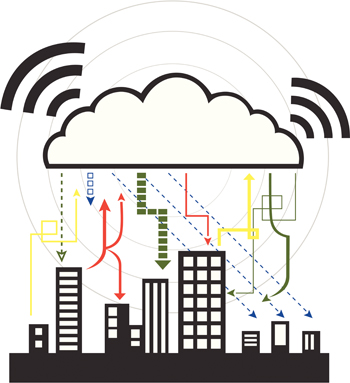IMDEA Networks

Energy management of cloud computing improved
03 October 2014

Researchers at IMDEA Networks Institute and other international centers have presented improvements in the energy management of cloud computing centers, such as new models of energy consumption on the servers or ways to reduce the wire length. The developments are part of the inter-university project CLOUDS.
Cloud computing is not only the latest revolution in the ICT world, but a key enhancer of innovation and economic development. Within the framework of the project CLOUDS, Madrid-based researchers have made crucial scientific advances in the state-of-the-art of cloud computing.
“One of the results advances the state of the art in the energy management of data centers that provide cloud services”, explains Jordi Arjona Aroca, researcher at IMDEA Networks Networks and co-author of a study published by the IEEE Journal on Selected Areas in Communications.
“Specifically, our approach goes from modeling the energy consumption of the servers and the communication system to proposing ways of physically deploying the racks of servers to minimize wire length”, adds the scientist.

"Cloud computing will increase the accessibility of users to administration and business services / IMDEA Networks"
The cloud allows the crossing of technological, geographical and administrative boundaries, concentrating information and services in data centers and devices that are remote but accessible online at any time, from anywhere and from almost any device or terminal. The level of autonomy, scalability, automation and flexibility this computing model provides is unprecedented.
The potential applications of cloud comuting impact various areas. From cellular telephony (HLRs, fraud detection, real time processing of CDRs), banking and finance (detecting fraudulent card payments and money laundering), business intelligence (real time data warehousing and scalable targeted advertising), safety (mitigation of denial-of-service attacks, processing systems security events), sensor networks (processing output of massive sensor networks) to domotics (smart buildings), to name but a few.
The CLOUDS (Cloud Computing for Scalable, Reliable and Ubiquitous Services) project has been financed by the Department of Education, Youth and Sports of the Regional Government of Madrid and was in operation from January 2010 to May 2014. Researchers at IMDEA Networks Institute collaborated with research groups from two Madrid universities, the Polytechnic University of Madrid and the University Rey Juan Carlos.
Resources:
Lin Wang, Fa Zhang, Jordi Arjona Aroca, Athanasios V. Vasilakos, Kai Zheng, Chenying Hou, Dan Li, Zhiyong Liu (January 2014)
GreenDCN: a General Framework for Achieving Network Energy Efficiency in Data Centers [PDF ]
IEEE Journal on Selected Areas in Communications (JSAC), 32 (1). pp. 4-15. ISSN 7338716
Jordi Arjona Aroca, Angelos Chatzipapas, Antonio Fernández Anta, Vincenzo Mancuso (May 2014)
A Measurement-based Analysis of the Energy Consumption of Data Center Servers (Paper) [PDF ]
In: The 5th International Conference on Energy-Efficient Computing and Networking(ACM e-Energy 2014), 11-13 June 2014, Cambridge, United Kingdom


Recent Comments